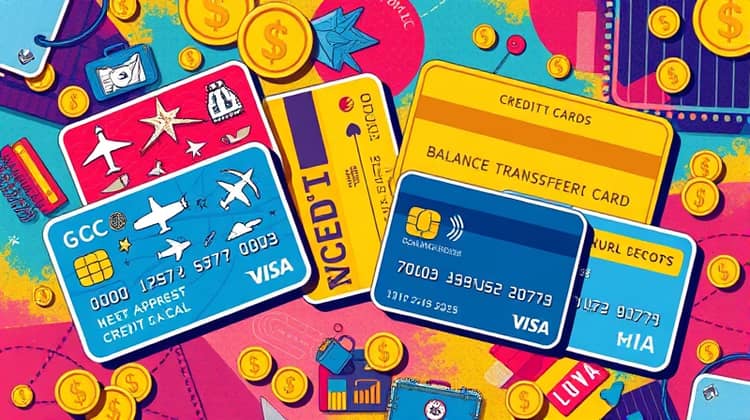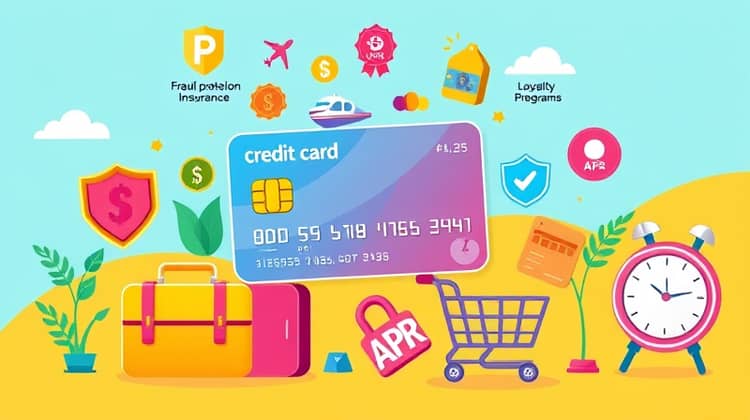Choosing the right credit card can significantly impact your financial health and overall spending habits. With various credit card options available, each with its unique features, it’s essential to identify which card aligns best with your financial needs and lifestyle. This guide will walk you through the critical aspects to consider when selecting a credit card, helping you to make an informed choice.
Before diving into the details, it’s crucial to understand that not every credit card is suitable for every individual. What works for one person may not work for another. Therefore, assessing your financial situation and understanding what each card offers will enable you to find one that complements your spending habits and enhances your financial goals.
Whether you are looking to build credit, earn rewards, or manage expenses, knowing how to navigate the application process and what to consider can simplify your decision-making. Start by exploring the following critical areas to ensure you choose the card that best suits your needs.
1. Understand Your Credit Score

Your credit score is one of the most critical factors lenders use to determine your creditworthiness. It represents your credit history and is a numerical expression of your reliability in managing credit. A higher score generally means you are a low-risk borrower, which can open up opportunities for better credit card offers.
Before applying for a credit card, it's advisable to check your credit score. This will give you a better understanding of what cards you might qualify for and what terms you can expect. Many credit card companies provide free access to your credit score, or you can check it via various online services.
Understanding your credit score allows you to make informed decisions, especially when it comes to choosing a card with favorable interest rates and rewards programs. Knowing where you stand will help you avoid applying for cards that are out of your reach. Additionally, if your score is lower than you'd like, you can take steps to improve it before applying.
- Access your credit report for free at annualcreditreport.com.
- Pay off outstanding debts to improve your score.
- Consider dispute any inaccuracies on your report.
2. Determine Your Spending Habits

Assessing your spending habits is essential before committing to a credit card. Carefully track your monthly expenses to identify categories where you spend the most. This analysis will help you choose a card that maximizes rewards or cashback for your primary spending areas, whether they are groceries, gas, or dining out.
Consider evaluating how often you travel or shop online, as specific cards are tailored towards these lifestyles. Understanding how you typically use a credit card can ensure that you select one that offers the best benefits for your lifestyle.
Once you understand your spending habits, it becomes easier to find a credit card that aligns with those patterns, allowing you to save money and earn rewards effectively.
- Do you spend more on groceries or entertainment?
- How often do you travel for work or leisure?
- Are you comfortable with a balance transfer credit card?
This knowledge will be instrumental in choosing a credit card that suits your needs and offers valuable returns on your purchases. Remember that the right card can help you save, whether through rewards, cashback, or lower interest rates.
3. Know the Different Types of Credit Cards

There are various kinds of credit cards available on the market, each designed for specific purposes. Understanding the differences can help you find the right one for your financial habits. Some popular types include rewards cards, cash back cards, travel cards, and balance transfer cards.
Rewards cards offer points or miles for every purchase. These are great if you can pay off your balance in full each month to avoid interest charges while enjoying the added benefits. Cash back cards directly provide a percentage of your spending back as cash, which is simpler and often more appealing to those who don’t want to track points.
Travel cards usually come with benefits like free checked bags, travel insurance, and access to airport lounges, making them perfect for frequent flyers. Meanwhile, balance transfer cards can help you consolidate debt by allowing you to transfer existing credit card balances to a card with a lower interest rate.
- Reward cards for earning points or miles.
- Cashback cards for a percentage back on purchases.
- Travel cards with travel-related benefits.
Understanding these variations will empower you to select a credit card that aligns with your specific financial objectives and spending behavior. Each type has its distinct set of features, making it essential to align your choice with your financial habits.
Selecting the right type of card can yield significant benefits, ultimately leading to greater satisfaction with your credit card experience.
4. Compare Fees and Interest Rates

Before deciding on a credit card, it's essential to compare fees and interest rates across various options. Different cards come with varying annual fees, foreign transaction fees, late payment penalties, and interest rates on unpaid balances. Understanding these costs can help you avoid unpleasant surprises down the road.
- Look for cards with no annual fee if you’re just starting out.
- Be cautious of high-interest rates, especially if you plan to carry a balance.
- Find cards that offer benefits that justify any potential fees.
Taking the time to understand and compare these financial aspects will ensure you choose a credit card that doesn’t just offer attractive features but also remains cost-effective in the long run.
5. Read the Terms and Conditions

Every credit card comes with terms and conditions that outline your rights and obligations as a cardholder. It's crucial to read these documents carefully to understand how the card functions, what fees may apply, and what penalties you might incur if payments are missed.
Understanding the fine print will help you avoid any surprises and ensure that you are fully informed about the specifics of your card. This knowledge can guide your decision-making and help you manage your credit card responsibly.
6. Consider Additional Features and Benefits

Some credit cards offer additional features that can enhance your experience or provide more value. Look into aspects like fraud protection, travel insurance, and purchase protection. Depending on your lifestyle, these benefits can be valuable and provide peace of mind.
Additional features can include cashback rewards, loyalty programs, and introductory offers such as 0% APR for an introductory period. Understanding these can elevate your credit card experience.
7. Think About the Long Term

When picking a credit card, consider the long-term implications of your choice. Think about how the card will impact your finances in the coming years. A card with a high-interest rate might seem appealing today, but if economic circumstances change, it could become a financial burden down the line.
Additionally, consider what your future financial goals are. Will this card help you reach them? For instance, if you plan on traveling extensively in the next few years, choosing a travel rewards card could be beneficial. By evaluating both your immediate and future needs, you can make a more effective decision.
Understanding the long-term costs and benefits of a credit card can help you avoid falling into debt and ensure that your credit card works for you, not against you.
8. Apply Responsibly

Before applying for a credit card, ensure that you meet the eligibility requirements and that you’re comfortable with the terms. Each time you apply for a credit card, it results in a hard inquiry on your credit report, which can impact your credit score.
By being responsible in your application process, you can maintain or potentially improve your credit score while ensuring you secure the best possible credit card for your needs.
- Research different offers before making a decision.
- Make sure you meet the eligibility criteria for the card you're applying for.
Applying for credit is a significant financial decision, and it warrants careful consideration and responsible planning. By following these guidelines, you can confidently select a credit card that suits your lifestyle and is aligned with your financial objectives. This proactive approach will pave the way for a healthier financial future.














